Staying informed about your health is key. Understanding what MCHC in a blood test means is crucial. MCHC, or Mean Corpuscular Hemoglobin Concentration, is a vital measure for red blood cell health. It shows the average hemoglobin in these cells.
The MCHC blood test is important because it tells us about your blood’s oxygen-carrying ability. Knowing overall well-being and MCHC can help you stay healthy.
Let’s explore MCHC and its significance for you. This journey is for anyone interested in health, from patients to medical experts. We’ll uncover the importance of MCHC in blood tests.
Key Takeaways
- Insight into MCHC’s role in assessing red blood cell health
- Importance of MCHC in determining the oxygen-carrying capacity of blood
- Understanding MCHC as part of a routine blood test
- Connection between MCHC values and overall well-being
- Ideas to prepare for accurate MCHC results in blood tests
Introduction to MCHC and Its Importance
Learning about the mchc meaning changes how we see blood health. MCHC, or Mean Corpuscular Hemoglobin Concentration, is key in hematology. It shows how much hemoglobin is in red cells. This helps us see if red blood cells are working right.
The importance of mchc in blood health is huge. It’s a big part of blood tests. It helps find and watch health problems.
Doctors look at MCHC levels to learn about blood health. They can spot issues like anemia or if someone is dehydrated. So, knowing about MCHC is important for health.
The importance of mchc in blood health is clear when you think about it. Normal MCHC means good health. But, if it’s off, it might mean iron deficiency or spherocytosis.
| MCHC Value | What It May Indicate |
|---|---|
| Below normal | Possible iron-deficiency anemia |
| Normal | Healthy red blood cell function |
| Above normal | Potential dehydration or spherocytosis |
MCHC’s role in medicine is huge. It shows why knowing its meaning is so important. It’s also key in managing health care.
What MCHC in a Blood Test Reveals About Your Health
Understanding the mchc interpretation in your blood test results is key. MCHC, or Mean Corpuscular Hemoglobin Concentration, is a vital indicator. It helps identify and diagnose health conditions. This section will explain how these levels show your health status and what health issues they might suggest.
MCHC levels show how much hemoglobin is in each red blood cell. Abnormal levels can point to several health issues, from minor to severe. Here’s what different MCHC values might mean for your health:
- Low MCHC Levels: Often signal issues like iron-deficiency anemia or chronic blood loss.
- High MCHC Levels: Could suggest the presence of hereditary spherocytosis, liver disease, or other conditions leading to hyperchromic red cells.
These insights help healthcare providers understand the mchc levels’ impact on health. They can then tailor treatments to address the root cause of abnormal MCHC values. This ensures effective management of the associated conditions.
Breaking Down the Acronym: MCHC Meaning Explained
When you look at a blood report, you might see MCHC. It stands for mean corpuscular hemoglobin concentration. This number is key to checking your blood’s health and spotting health issues. Knowing what MCHC means and its role in your body can make your blood test results clearer.
Defining Mean Corpuscular Hemoglobin Concentration
MCHC is a blood test measure that shows the average hemoglobin in red blood cells. Hemoglobin is a protein that carries oxygen. The MCHC value is found by dividing hemoglobin by hematocrit and is in grams per deciliter. It shows how well hemoglobin spreads in red blood cells, crucial for oxygen transport.
The Role of Hemoglobin in the Body
Hemoglobin is essential in the body. It carries oxygen to tissues and carbon dioxide back to the lungs. Its ability to bind oxygen is linked to MCHC levels. Healthy MCHC levels mean hemoglobin works well, showing active red blood cells.
To sum up, knowing about MCHC and hemoglobin is vital. It shows how important healthy MCHC levels are for good oxygen delivery and health.
Diving Into Blood Test Panels: Where MCHC Fits In
Understanding mchc in comprehensive blood panels is key. MCHC, or Mean Corpuscular Hemoglobin Concentration, shows the average hemoglobin in red blood cells. It’s a crucial part of health checks.
MCHC’s role in blood tests is huge. It helps spot and track issues like anemia and other hemoglobin problems. Let’s explore its place among other blood test parts.
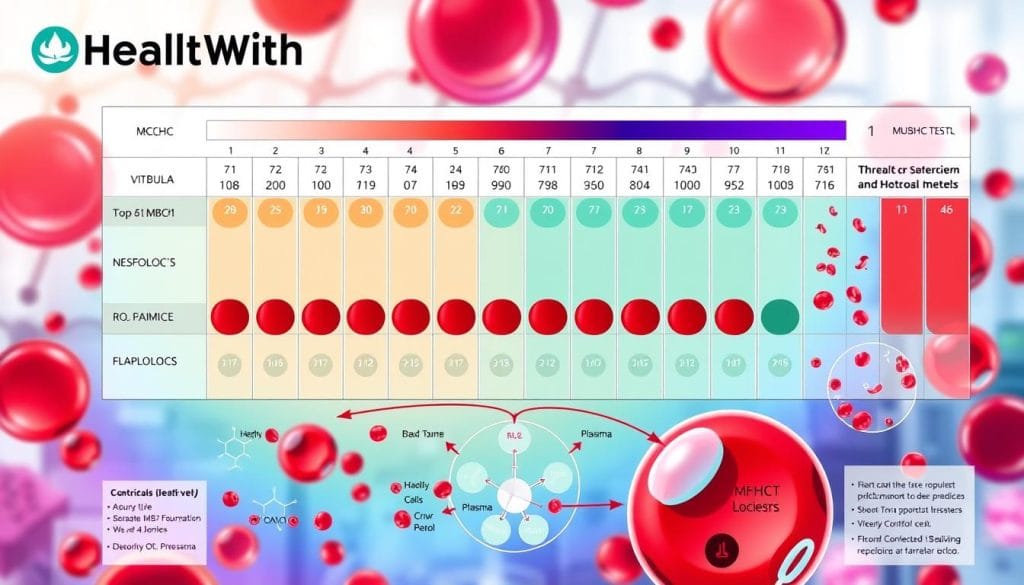
| Component | Description | Importance |
|---|---|---|
| MCHC | Measures average hemoglobin concentration | Essential for diagnosing anemia |
| WBC (White Blood Cells) | Indicates immune function | Crucial for identifying infections |
| RBC (Red Blood Cells) | Carries oxygen in the blood | Key in assessing overall health |
| Platelets | Involved in blood clotting | Important for wound healing |
Knowing where mchc in comprehensive blood panels fits helps us understand health better. It shows how different parts of blood tests work together. This knowledge helps us manage health issues better.
The MCHC Blood Test: A Critical Component of CBC
The mchc blood test importance is huge for checking your health. MCHC, or Mean Corpuscular Hemoglobin Concentration, is key in a complete blood count analysis.
Understanding Complete Blood Count (CBC)
A Complete Blood Count (CBC) is a vital test for your health. It spots issues like anemia, infections, and leukemia. MCHC checks the hemoglobin in red blood cells.
The Significance of MCHC within the CBC
The mchc contribution to CBC is more than just a number. It helps diagnose anemia types. Low MCHC might mean iron deficiency anemia. High MCHC could point to spherocytosis or lab mistakes.
Learn more about mchc’s role in health on a trusted site. Check out this article.
| MCHC Role | Health Implication | Condition Indicator |
|---|---|---|
| Indicator of Hemoglobin Concentration | Detects overall hemoglobin health | Anemia, Hyperchromia |
| Calculation of RBC hemoglobin concentration | Essential for diagnosis of blood disorders | Iron-deficiency anemia, Spherocytosis |
Knowing MCHC’s role in CBC helps doctors and patients. It shows the mchc blood test importance in health checks.
Decoding Your Lab Report: MCHC Normal Range and Variations
When you get your lab report, it’s important to know about the MCHC normal range and its variations. MCHC stands for Mean Corpuscular Hemoglobin Concentration. It’s a key part of a Complete Blood Count (CBC). To understand your MCHC results, compare them to the normal ranges and think about factors that might affect them.
Normal MCHC Levels in Adults and Children
The mchc normal range is different for adults and children. This is because they have different body needs. Here’s what the normal range is for each:
| Age Group | Normal MCHC Range (g/dL) |
|---|---|
| Adults | 32-36 |
| Children | 32-34 |
If your MCHC results are within these ranges, it usually means your blood has the right amount of hemoglobin. But, your results can vary based on your health and other things.
Factors Influencing MCHC Values
Many things can change your MCHC levels, making them go up or down. These include:
- Hydration levels – Being dehydrated can make MCHC seem higher, while too much water can make it seem lower.
- Nutritional status – Not getting enough B12 or folate can affect hemoglobin and MCHC.
- Chronic diseases – Diseases like liver problems or chronic inflammation can also change MCHC levels.
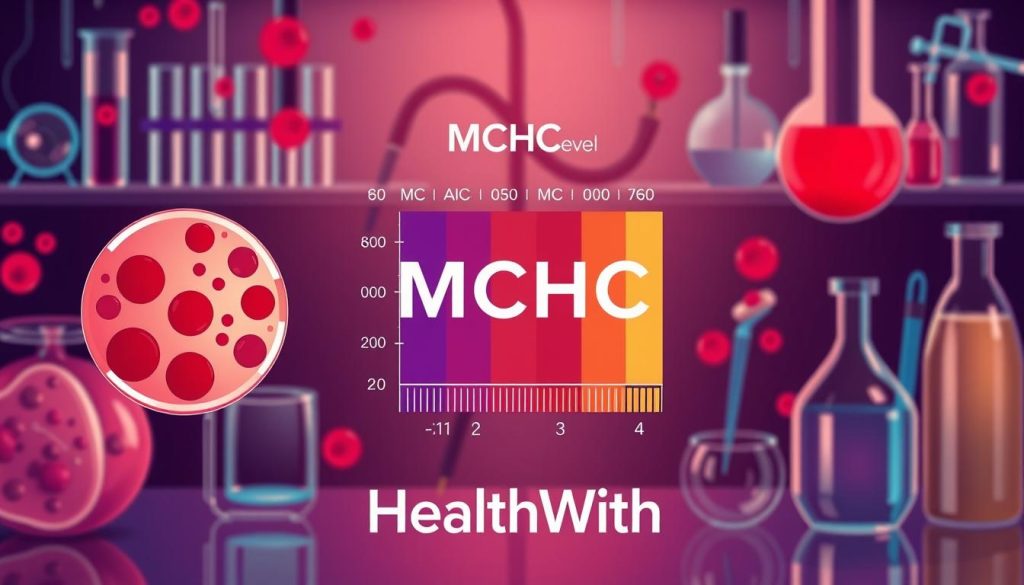
Knowing the mchc normal range, interpreting MCHC results, and what factors affecting MCHC are can help you understand your health better. It also helps you talk to your doctor about any health concerns shown by your MCHC levels.
When MCHC Levels Are Low: Causes and Health Implications
Looking into mchc low levels can give us important health insights. Healthy blood has many parts, with MCHC showing the average hemoglobin in red blood cells. Finding out why causes of low mchc is key to understanding health issues that might need more attention.
Iron Deficiency and Its Effects on MCHC
Iron deficiency is the main reason for low MCHC. It affects how much hemoglobin is made. Hemoglobin is key for carrying oxygen in the body. Without enough iron, the body can’t make enough healthy red blood cells.
This leads to anemia, causing fatigue, weakness, and pale skin. The iron deficiency impact on mchc shows in lower hemoglobin levels in red blood cells.
Other Health Conditions Leading to Low MCHC
- Chronic diseases like kidney disease or chronic inflammation can affect hemoglobin production.
- Thalassemia, a genetic disorder, causes abnormal hemoglobin, affecting MCHC levels.
- Vitamin deficiencies, especially B12 and folate, are important for DNA in red blood cells, impacting MCHC.
Fixing low MCHC isn’t just about supplements or diet changes. It also means managing the underlying causes. Getting help from healthcare providers is crucial for a proper diagnosis and treatment plan.
MCHC High: Potential Health Concerns and Their Sources
Seeing a mchc high value in blood tests can worry you. It means you might have health problems that need looking into. These issues might need special care.
Significance of Elevated MCHC Results
An MCHC value that’s too high is a red flag. It points to health concerns with high mchc that might need quick action. Finding out why MCHC is high early helps doctors treat you better.
Common Diseases Associated with High MCHC
High MCHC levels are linked to several diseases. Each disease has its own set of challenges and symptoms. Knowing this helps doctors diagnose and treat you right.
| Disease | Impact on MCHC | Common Symptoms |
|---|---|---|
| Autoimmune Hemolytic Anemia (AIHA) | Significantly raises MCHC | Weakness, pale skin, fatigue |
| Hereditary Spherocytosis | Elevates MCHC | Jaundice, enlarged spleen |
| Liver Disease | Moderate increase in MCHC | Abdominal pain, swelling, yellowing of the skin |
| Macrocytic Anemia | Increased MCHC level | Shortness of breath, fatigue, difficulty concentrating |
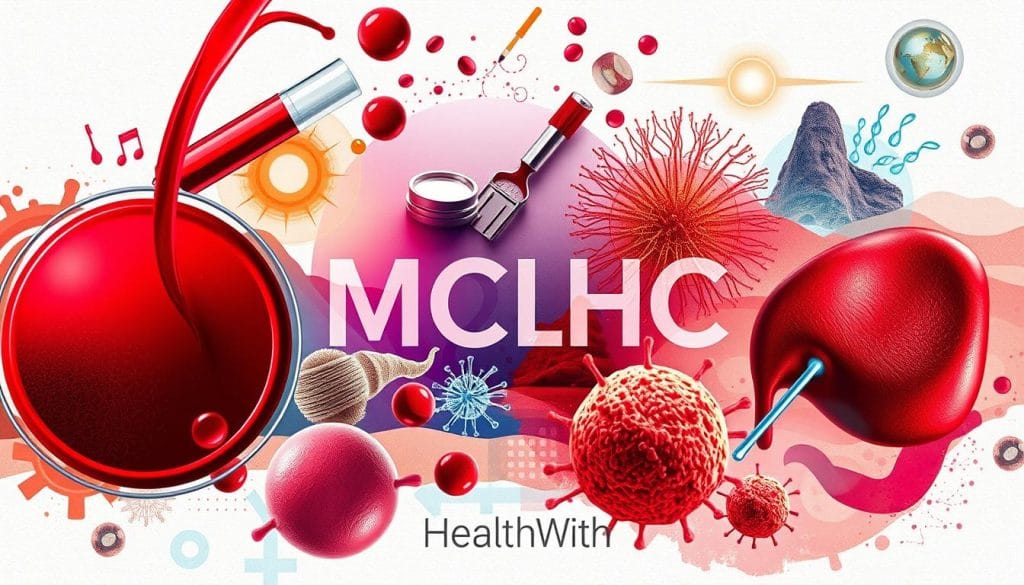
Knowing how mchc high levels relate to diseases helps doctors. They can focus on treating the cause, not just the symptoms. This approach helps fix the main problem and lowers the risk of complications.
MCHC Interpretation: Understanding What Your Results Mean
Knowing how to read mchc interpretation guidelines is key to understanding your health through blood tests. This guide helps you understand what your MCHC results mean. It’s important for your health.
When you get your blood test results, you’ll see a figure called Mean Corpuscular Hemoglobin Concentration or MCHC. It shows how much hemoglobin is in your red blood cells. This number is crucial for diagnosing health issues.
- Normal Range: MCHC values usually range from 32% to 36%.
- Low MCHC: This might mean you have iron deficiency anemia or a chronic disease.
- High MCHC: This is less common but could point to hereditary spherocytosis or autoimmune hemolytic anemia.
To understand your MCHC results, it’s not just about knowing the ranges. You also need to know what it means if your numbers are off. Here’s a simple table to help:
| MCHC Level | Potential Condition |
|---|---|
| Below 32% | Anemia, Iron Deficiency |
| 32% – 36% | Normal Healthy Range |
| Above 36% | Hereditary Spherocytosis, Autoimmune Hemolytic Anemia |
In conclusion, mchc interpretation guidelines are a powerful tool for understanding your health. Recognizing the importance of your results can help you catch and manage health problems early.
Factors That Can Affect MCHC Levels in Blood Tests
Knowing what affects Mean Corpuscular Hemoglobin Concentration (MCHC) in blood tests is key. Diet and how much water we drink are big factors. This part talks about how these things change MCHC levels, helping us manage our health better.
Dietary Influences on MCHC
The dietary impact on MCHC is big. Nutrients like iron, vitamin B12, and folate are crucial for making and working of hemoglobin. If we don’t get enough, we might get anemia, which lowers MCHC. But eating right can keep MCHC levels where they should be.
How Dehydration and Overhydration Alter MCHC
Dehydration and MCHC levels are connected. Not drinking enough water can make MCHC seem higher because there’s less liquid in the blood. Drinking too much water can make it seem lower. So, drinking just the right amount is key for accurate MCHC readings.
| Nutrient | Impact on MCHC | Recommended Sources |
|---|---|---|
| Iron | Essential for hemoglobin, affects MCHC directly | Red meat, spinach, lentils |
| Vitamin B12 | Important for red blood cell formation, influences MCHC | Fish, dairy products, fortified cereals |
| Folate | Necessary for DNA synthesis in red blood cells, impacts MCHC | Leafy greens, nuts, beans |
Understanding and managing the factors affecting MCHC is important for better health checks and treatments. Whether it’s through what we eat or how much water we drink, controlling these can help keep MCHC in a healthy range. This is good for our overall health.
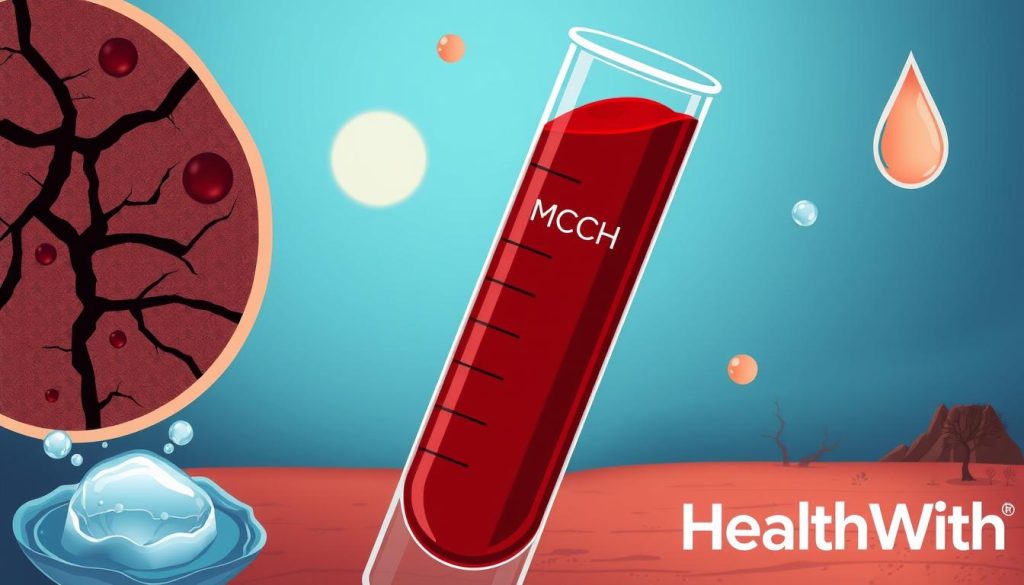
How MCHC Fits into Anemia Diagnosis and Monitoring
The MCHC role in anemia is key. It’s a vital part of blood tests for anemia. Mean Corpuscular Hemoglobin Concentration (MCHC) shows how much hemoglobin is in red blood cells. This helps doctors understand the hemoglobin in red blood cells, which is important for diagnosing and checking how severe anemia is.
For anemia monitoring with MCHC, regular tests are crucial. They help see if treatments are working or if changes are needed. This is especially true for long-term cases or when patients are trying new treatments like diet changes or supplements.
| Anemia Type | MCHC Level indication | Typical Treatment Approach |
|---|---|---|
| Iron Deficiency Anemia | Low MCHC | Iron supplements, dietary changes |
| Sickle Cell Anemia | Normal or slightly low MCHC | Medication, pain management, and possibly blood transfusions |
| Hereditary Spherocytosis | High MCHC | Splenectomy, folic acid supplementation |
Remember, MCHC alone can’t decide on a diagnosis or treatment for anemia. It’s best used with other tests and doctor’s checks to get a full picture. Knowing if MCHC is high or low helps doctors find the right treatments. It’s a big part of taking care of patients.
Preparation for Your Blood Test: Tips for Accurate MCHC Results
Getting ready for a blood test is key to getting accurate results, especially for mean corpuscular hemoglobin concentration (MCHC). Here are important tips for blood test preparation to ensure accurate MCHC results.
- Fast Appropriately: Fasting might be needed for your blood test. Fasting for 8-12 hours helps remove nutrients and substances from your blood. This makes MCHC readings more precise.
- Stay Hydrated: Drinking water before your blood test is good, but don’t overdo it. Drinking enough water helps make it easier to draw blood.
- Avoid Certain Medications and Supplements: Some drugs and supplements can affect blood test results. Tell your doctor about any medications you’re taking to see if you should stop them before the test.
- Avoid Alcohol and Nicotine: Alcohol and nicotine can also impact blood test results, including MCHC levels. It’s best to avoid them before your test.
- Minimize Stress: Stress can change your body’s chemistry and affect blood test results. Try to relax and stay calm before and during the test.
Following these tips helps ensure accurate MCHC results and makes your blood tests more reliable. For more health tips and information on preventive care, check out this article on health benefits.
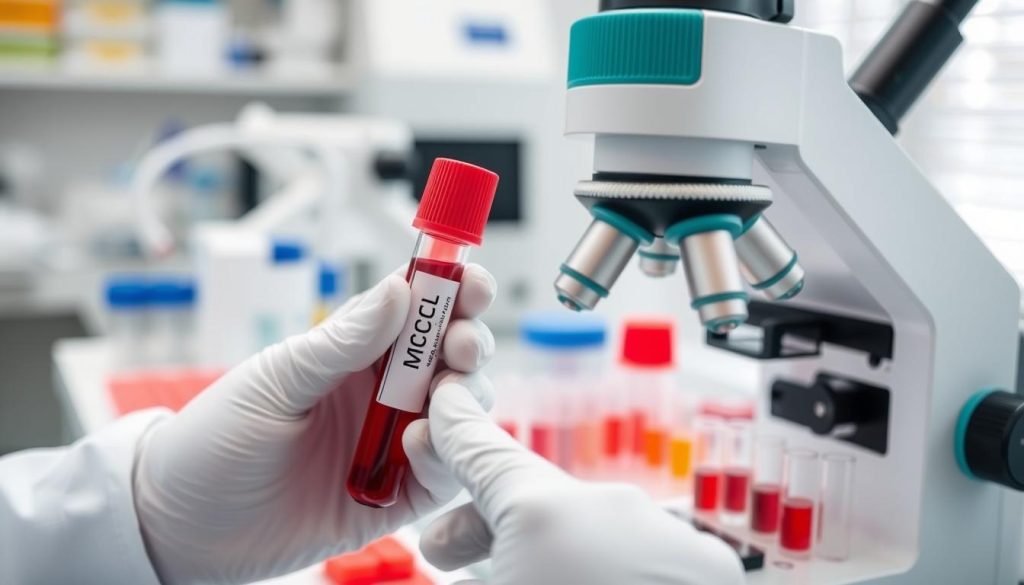
The success of your medical tests depends on accurate results, which starts with proper blood test preparation. By following these tips carefully, you ensure your blood test results are trustworthy. This helps doctors make better decisions for your health.
Conclusion
We’ve explored Mean Corpuscular Hemoglobin Concentration (MCHC) and its role in medical tests. Understanding MCHC in blood tests is key for spotting health issues like anemia. It also helps check if treatments are working well.
MCHC shows how healthy our red blood cells are. This is important for our overall health.
Looking at a Complete Blood Count (CBC), we see MCHC’s value. It gives doctors important info about our hemoglobin levels. Knowing this helps them make better health decisions for us.
It’s important to remember that only doctors can fully understand the significance of MCHC results. Trying to figure it out yourself can cause worry or miss important health problems.
For patients or health enthusiasts, knowing about MCHC is powerful. It helps you talk better with your doctor and take care of your health. So, when you see your MCHC levels, remember what we learned. It’s a big part of medical checks.
FAQ
What is MCHC in a blood test?
MCHC stands for Mean Corpuscular Hemoglobin Concentration. It measures the average hemoglobin in your red blood cells. It’s part of a blood test called a complete blood count (CBC).
Why is understanding MCHC important for overall well-being?
Knowing about MCHC is key because it shows how well your red blood cells work. It helps carry oxygen. If MCHC levels are off, it might mean you have anemia or another blood issue.
What does a low MCHC level indicate?
A low MCHC means your red blood cells might not have enough hemoglobin. This often points to iron deficiency anemia or chronic blood loss.
What could cause high MCHC in a blood test?
High MCHC can happen for many reasons. It might be due to spherocytosis, dehydration, or other health problems.
What is the MCHC normal range?
The normal MCHC range is usually between 33 and 36 g/dL. But, this can change based on the lab and population. Always talk to your doctor about what’s normal for you.
How can diet affect MCHC levels?
What you eat can change your MCHC levels. Eating too little iron, vitamin B12, or folic acid can lower MCHC. These nutrients are key for making hemoglobin.
Can hydration levels change MCHC values?
Yes, how much water you have can change MCHC values. Dehydration can make MCHC seem higher, while too much water can make it seem lower.
What does MCHC tell us in anemia diagnosis?
MCHC helps doctors figure out what kind of anemia you might have. It shows if the problem is with making or losing red blood cells, or with hemoglobin.
How should I prepare for a blood test to ensure accurate MCHC results?
To get accurate MCHC results, follow your doctor’s instructions. This might mean fasting or staying hydrated. Avoid dehydration or overhydration to get the best results.
What should I do if my MCHC level is abnormal?
If your MCHC is not normal, talk to your doctor right away. They’ll look at your results and your health. They might suggest more tests or a treatment plan.

















